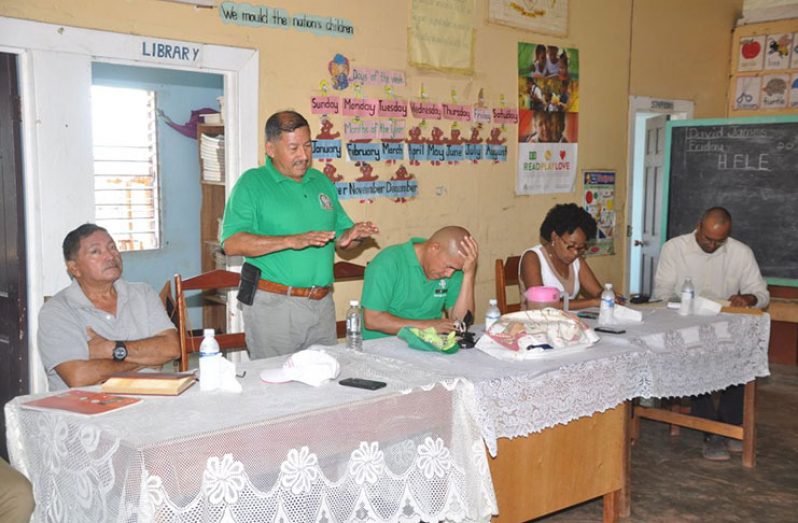— Indigenous peoples urged to help in the education process
RESIDENTS of the Rupununi, in particular those of Indigenous origin must help to change the mindsets of coastlanders by educating them about life in the Rupununi, Indigenous Peoples Affairs Minister Sydney Allicock has said.
Allicock, during a joint visit to the community of Hiawa, Rupununi, Region Nine on Saturday, told villagers that the time has come for Indigenous villages to open all doors to make their contributions known.
He called on the villagers to build the image of the Rupununi, citing the example of Jamaica and that country being known for icons such as Bob Marley and Usain Bolt.
The minister also called on the Indigenous population to reject policy-makers’ assertions that they need to be educated, noting that it is the Indigenous peoples of Guyana who have helped many researchers to become doctors and scientists.
In fact, the minister noted that those who aided in that process were not formally educated, but their knowledge of the hinterland and the eco-system proved vital in researchers’ work.
“Education should not be seen as a one-way thing where I heard policy-makers, planners saying we have to take education to the Amerindian people. We must stop them when they say that. I prefer them to say we are going to share education with the Indigenous peoples,” said Minister Allicock while at the Hiawa Primary School.
The minister said the time has come for Indigenous peoples to embrace their culture and teachings, while merging same with modern advancements.
“What we need is appropriate education, balanced education and here is where we need the sort of institution to link with the UG and other universities; it is a sharing experience. We need more Guyanese to know what Guyana is,” the minister emphasised.
The hinterland, he said, must be seen as a place not only for refuge, but a place to be well-respected.

“We need to change the mindset; we can do it, but to do it, we have to come together as partners for the development of this country.”
The minister noted that oftentimes tourists enter the hinterland regions and pollute it, thereby causing ailments to those who reside there.
In that light, he urged that there be village rules that govern what transpires in each community.
The minister spoke to the Village Improvement Plan (VIP) and urged village leaders to have such in place, noting that it would serve as a guide for future development.
“… you have to get yourself in order first. Many communities do not know what they have; they are given a piece of land, but they don’t know how many people they have… we would like to see a programme where residents’ list is updated every month,” he said, urging that there be proper data management.
Meanwhile, Minister Allicock believes that the people of the Rupununi need to be rounded individuals and lauded the Bina Hill School of Learning as a pioneer in this regard.
“It is time we take responsibility for our development by educating our people or opening up institutions that will help our people right within the region to excel. Use the Bina Hill School for Learning as that possibility; we are working towards that.”
Currently, there is an expansion programme ongoing for the institute’s dormitories, and according to the minister, many of those who graduated from the institution in July were provided with job opportunities by members of the business community.
“We are talking about a rounded work force and we are aiming for and it is going to help; this institution is to help brand the Rupununi. It must come within us that this is our thing… the branding is your identity. We are working to bring the people out of the darkness to prove we have a contribution to make where national development is concerned,” Allicock concluded.
The residents of Hiawa agreed with Minister Allicock and pleaded with him to have government establish more technical institutions within Region Nine to benefit young people.
Minister Allicock was part of a team who visited the satellite communities of Nappi, Parishara and Hiawa. The team included Minister of Social Cohesion, Youth, Culture and Sport, Dr George Norton and Region Nine Chairman Brian Allicock.




.png)









